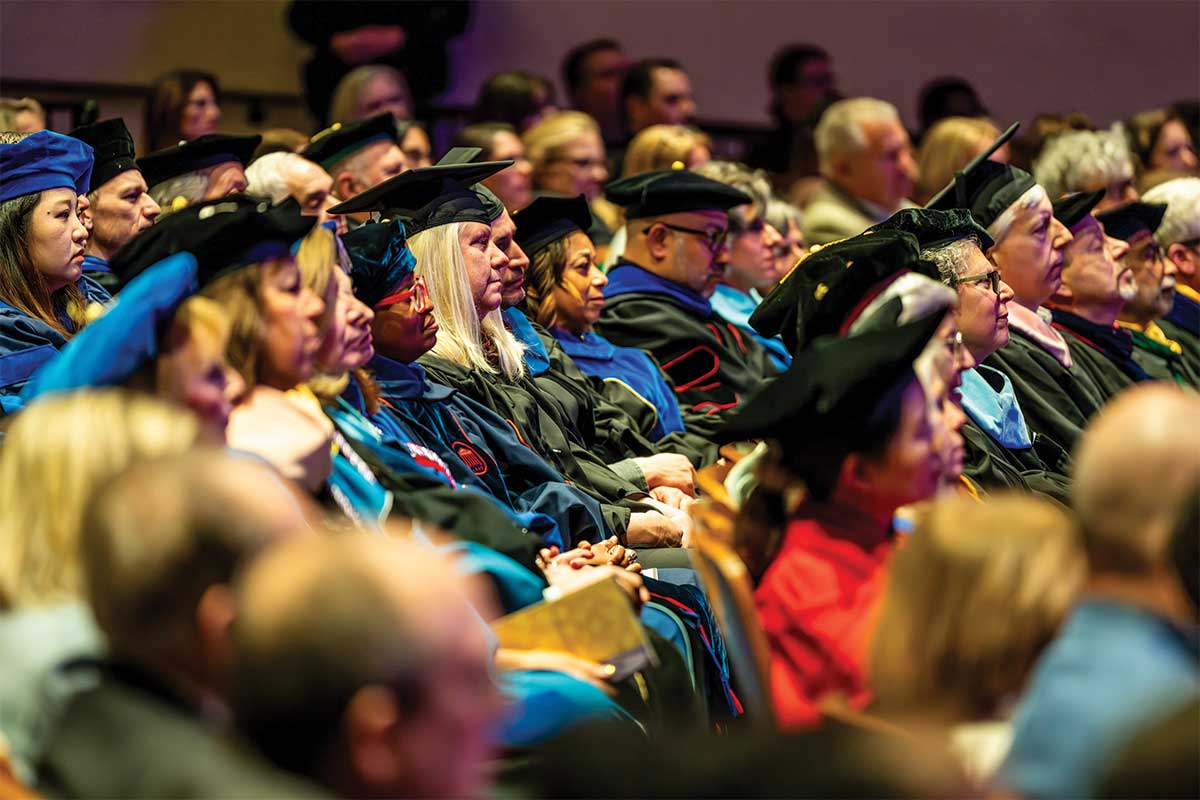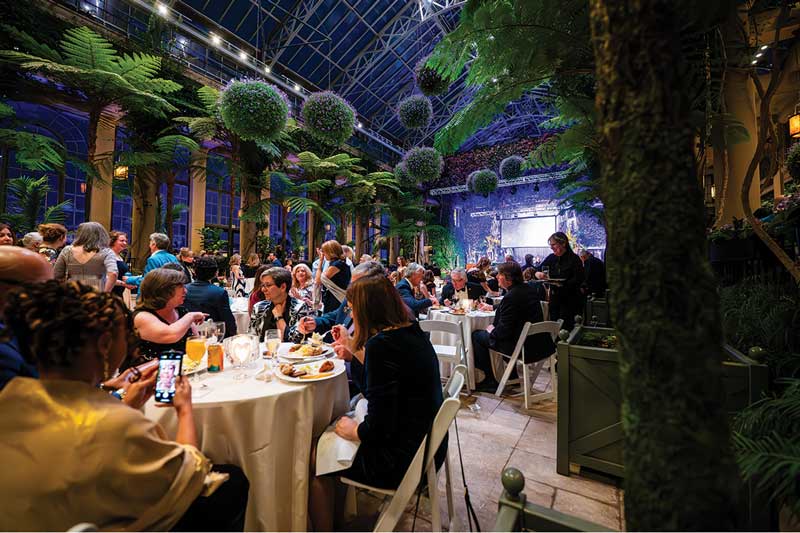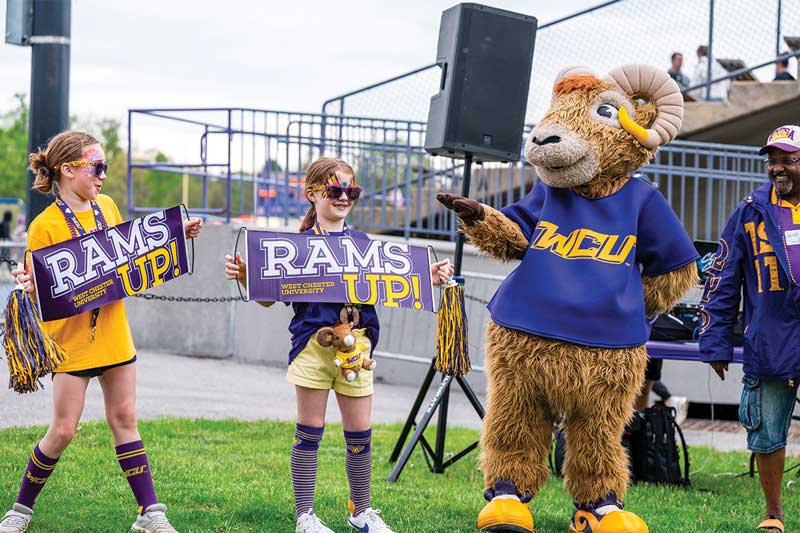
COVER STORY
Integrating Career Readiness into the
Campus Culture

The Career Center hosts multiple job fairs every year, including several that are industry-specific such as public service and sustainability.
“Preparing students to launch into the world and into their careers is a team sport,” says Jennifer Rossi Long ’05, who leads campus-wide career preparation efforts at the University as the executive director of the Twardowski Career Development Center.
“Everyone has to be engaged and involved in that process for it to work, because we could turn out the most phenomenally career-ready students, and if there were no employers, it doesn’t matter,” she explains. “Or employers could be hiring like crazy, the biggest hiring boom we’ve ever seen, and if the students aren’t career-ready, it also doesn’t matter.”
While students have to take the initiative regarding their career journeys, there’s plenty of support across campus for them not only to prepare for professional roles but to explore companies, fields, and industries through experiences they can put on their resumes. Internships, practicums, research, job shadowing, and volunteer experiences all lead to better-prepared graduates and, in the case of internships, higher average starting salaries according to the National Association of Colleges and Employers (NACE). Students who complete internships and learn to network report finding their degrees more relevant.
Experiential opportunities offer ways for students to explore avenues they might not have thought of prior; get hands-on experience with technology and applications of theory they learn in the classroom; broaden their horizons with study abroad; and gain confidence.
Campus job and internship fairs are recruiting events that draw 4,400 students annually. The career center also collaborates with the Greater West Chester Chamber and the Business Improvement District on a part-time job fair to connect students with uptown businesses. The center co-hosts another fair with the County of Chester and PA CareerLink for students and county residents.
In the 2021-22 academic year, we were initially engaging around 40% of the student population and we’ve now made the jump to 49%.
We’re trying to move career development out of the optional space and infuse it more into the campus experience.
The center, which is celebrating its 60th anniversary this year, is the campus career hub, offering the fairs plus meet-ups, resume review days, information tables, and workshops. Students use the Handshake career platform to connect with the center’s staff and student staff; research internships and job opportunities; and explore employer events that happen on-campus, off-campus, and virtually. While in-person consultations with counselors are always an option, integrating career planning into the campus culture means the center’s services are not confined to its physical location in Lawrence Center.
Long reports that her staff engages with 49% of the 17,000+ undergraduate and graduate students enrolled. “In the 2021-22 academic year, we were initially engaging around 40% of the student population and we’ve now made the jump to 49%. We would not have been able to make those gains year over year through one-on-one appointments. That growth comes from getting career readiness in front of more students in the classroom.”
Faculty are very involved in career development for our students, she emphasizes. “Faculty helped developed the survey that examined the state of career readiness for our students. The collective contributions of more than 1,000 voices helped drive how we focus our work.”
The center partners with WCU’s Academic Affairs division to provide faculty with support for career assignments and D2L (online) modules. The center’s staff serve as liaisons and will visit classrooms for training and activities, Long says.
Faculty are integral to many experiential learning opportunities, as in the case of mentoring fledgling researchers not only during each semester but also in the Summer Undergraduate Research Institute (SURI). Conducting research with a faculty mentor provides meaning and connections and can lead to student experiences such as presenting at conferences. Some of these programs offer student stipends.
Students aim to bridge the gap between theory and practice by applying knowledge in real-world contexts.
Long says that building career preparation into the classroom and campus culture can “scaffold getting students ready to launch. We’re trying to move career development out of the optional space and infuse it more into the campus experience.”
She uses the analogy of an airplane preparing for takeoff to emphasize the value of starting career exploration early in the college experience. “I tell parents at orientation that it starts in the first year, in the first-year experience courses,” she explains, “where we help students articulate their skills, interests, and values. Students think about career prep as a senior year thing, or something to worry about in the future. But when you see a plane take off, there’s a long runway because it needs to be able to build the momentum so that it can take off. When you start in your senior year, your runway is so short.”
I learned how to collaborate more than I would in a typical classroom.
That launch gets a boost from experiential learning, in which students aim to bridge the gap between theory and practice by applying knowledge in real-world contexts. A student intern or one in the work/study program who might never have worked in an office prior to college can develop confidence and refine specific career aspirations through an immersive experience.

Twardowski Career Development Center staff and student workers.
“One of the challenges I faced was multitasking and time management,” said Kevin Robertson ’25, who was an intern at WCU’s career center. He learned to balance his internship, schoolwork, and a job at Costco. He said the connections he made through his internship with professionals on campus and beyond are priceless.
62%
OF PARTICIPANTS ENGAGED IN EXPERIENTIAL LEARNING
Chase Zemitis, junior communications major, echoed Robertson’s thoughts about learning to prioritize tasks. He worked for Fitness Factory and spoke about the positive experiences he had planning and running community events, noting, “I learned how to collaborate more than I would in a typical classroom.”
Robertson and Zemitis participated in a student experiential learning panel at a spring employer appreciation breakfast hosted by the career center. Six students discussed their internships, work, and study abroad and expanded on the benefits they reaped.
Kristen Miller ’25, who earned her degree in public health, used her hospital internship to create patient health plans and stated, “I evolved my skills and made professional connections.” Kyanna Randolph ’25 worked with inner city youth on a media project and volunteered with an orphanage in Africa during an abroad program, learning to “be open to all situations.” Also at the event: student pianist Amanda Smith, a junior business major whose paid performance was another form of experiential learning.
Experiential learning can occur through on-campus internships, work, capstone, and volunteer opportunities with student organizations, but the University’s location is a benefit for students seeking external internship and volunteer positions. Students have job shadowed and had practicums with local schools and the Chester County Hospital (Penn Medicine); completed internships at QVC, Wawa, with uptown businesses and municipal government offices; volunteered with the SPCA, Habitat For Humanity, and Safe Harbor; and created capstone experiences that benefited local businesses and agencies that serve citizens’ health, wellness, and basic needs insecurity. The University’s Fund for Unpaid Internships ensures that some students don’t have to turn down an internship simply because they can’t afford to leave or curtail hours at a part-time job.
How do students find ExL opportunities?
In 2024, 85% of student respondents reported engaging in at least one experiential learning opportunity in the previous academic year.
Each fall, the career center invites students to complete a voluntary experiential learning survey. The survey asks about students’ involvement in hands-on learning experiences over the course of the last year, their plans for future involvement in experiential learning, and any challenges that keep them from engaging in these experiences. In 2024, 85% of student respondents reported engaging in at least one experiential learning opportunity in the previous academic year. They reported such highlights as gaining new knowledge and skills, gaining valuable experience for their resumes, and connecting with professionals and peers.
Where does all this lead? According to the first destination survey that tracks where WCU students land immediately after graduating, “91% of our 2024 graduates who responded are employed or pursuing further education within six months of graduation,” notes Long. “Our outcomes tend to remain pretty steady over time, 90% to 92% positive outcomes, meaning graduates are employed, they started their own business, they’re going to grad school.
“I just did a comparison to other public and private institutions nationwide and we are competitive with them. I think this is fascinating because we’re a fraction of the cost of many of them but students can expect similar, positive outcomes since we offer high-quality, highly accessible, and affordable public education. That’s a pretty magical formula.”
We’re a fraction of the cost...but students can expect similar, positive outcomes since we offer high quality, highly accessible, and affordable public education. That’s a pretty magical formula.

Left: Students who spoke at the center’s spring employer appreciation breakfast: (L-R) Kevin Robertson ’25, Aaliyah Wood ’25, Kyanna Randolph ’25, Eric Budu, Kristen Miller ’25, Chase Zemitis.
Right: Jennifer Rossi Long ’05
More from the Summer 2025 Issue
News
Believe and Achieve
Camp Abilities PA Celebrates 20th Anniversary at WCU
Center for STEM Inclusion
Gives Hands-on Experience
WSOM Marks a Milestone
35th Annual Precollegiate National Piano Competition
Profiles
Donor:
Brignola Family
Alumni:
Michele Prota ’06
Student:
Lilyana Campbell ’25
Faculty:
Marc Duey





